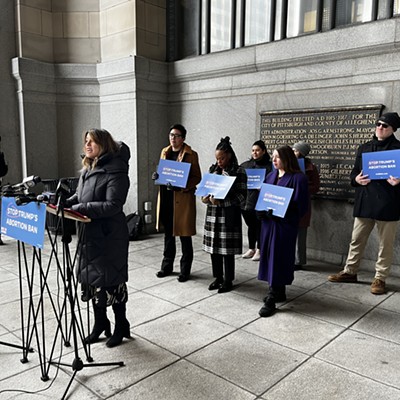Allegheny County’s chief public defender wants to switch sides. Matt Dugan, who has spent the bulk of his career climbing the ranks in the county’s public defense office, today announced his intention to challenge District Attorney Stephen Zappala in the Democratic primary this spring.
Dugan, 43, of Moon Township, tells Pittsburgh City Paper in an interview that he wants to be in district attorney’s office because it is best positioned to influence the direction of the county’s criminal legal system.
“The system is not designed to be run by the public defender's office,” Dugan says. “The chief law enforcement officer in this county is the district attorney's office, and they have immense discretion to shape policy and move the system forward.”
And after more than two decades of Zappala incumbency, Dugan says it’s time for someone new.
“In 2023, Allegheny County's justice system is in need of change. We need to think differently,” he says.
In particular, Dugan says he wants to focus the county’s resources on “competently prosecuting violent crime,” and he plans to do so, in part, by implementing “true diversion” programs that redirect those with low-level, nonviolent charges away from the criminal legal system.
According to Dugan, individuals charged with low-level and nonviolent offenses constitute “the vast, vast majority of the cases that we see and the people we see in the criminal justice system… And I think we have a real opportunity to think differently about how we prosecute those cases and why we're prosecuting those cases.”
Although Zappala has touted the establishment of specialty courts for cases involving drugs, mental health, and veterans as successful efforts to divert people from the criminal legal system, Dugan says these do not amount to “true diversion.”
“It takes a certain level of offender, meaning you have to have gone through the system multiple times and failed multiple times before you're even eligible to be considered for these programs,” Dugan says. “We know treatment courts work. When people get these services, they are less likely to recidivate. We just need to do this sooner in the process… there's an opportunity to get in front of this, to be more proactive, to focus more on prevention than to be reactive and focus on punishment.”
Instead, Dugan says he envisions collaboration between the DA’s office, local and state leaders, and social service providers to “end [low-level] matters without the lifelong consequence of criminal conviction.” Our criminal legal system was not designed to address substance use disorder or mental illness, he says, naming those as two of the major reasons people enter the criminal legal system in the first place.
Zappala has shown less optimism about tackling the roots of crime during media interviews.
“Crime has a direct correlation to poverty,” Zappala told the Post-Gazette in 2019. “I’m not in charge of transportation, safe and decent housing, or education. I’m on the back end of government.”
Dugan says he has a different understanding of the district attorney's role.
“I do see a place for the district attorney to think more about crime prevention and to address the issues that are really driving people into the criminal justice system in the first place,” he says.
Dugan believes that successfully diverting more low-level cases out of the Court of Common Pleas would lead to a variety of positive outcomes.
True diversion would free up assistant district attorneys to focus on more serious cases and help the county attract and retain talented lawyers, he says. “We see a huge amount of turnover in [the DA’s] office, which leads to younger, lesser experienced attorneys handling some of these major cases, and we've seen that that hasn't worked out well over the past couple of years.”
Additionally, Dugan argues, if the county’s legal system moved faster and more efficiently, that would reduce the county jail population and the average length of stay at the jail, saving money for taxpayers. “Forty two cents of every dollar folks spend in their Allegheny County taxes goes to support this criminal justice system,” he says.
Dugan also says he’s committed to addressing the well-documented racial disparities in the county's legal system.
“Every policy that we have, every directive we have in the district attorney's office, every new initiative will always be looked at through the lens of how does this impact racial disparity in the system?”
After taking office in 1999, Zappala ran unopposed until 2019, where he defeated two progressive challengers. Although those challengers, Turahn Jenkins and Lisa Middleman, showed strong support within city lines, Zappala dominated the suburbs.
A resident and former school board member in Moon Township, Dugan tells City Paper he’s confident he can appeal to suburban voters.
“I live in the suburbs. I talk to folks about the issues that exist in the suburbs, and while they're different, potentially, than the issues that the city faces, there are still significant issues, right? I mean, mental health, substance abuse, instability, those things don't discriminate. Those are issues that exist both in the city and the suburbs. And I've had conversations with folks well outside the city limits in Allegheny County, who are just as worried about the criminal justice system as folks in the city.”



















